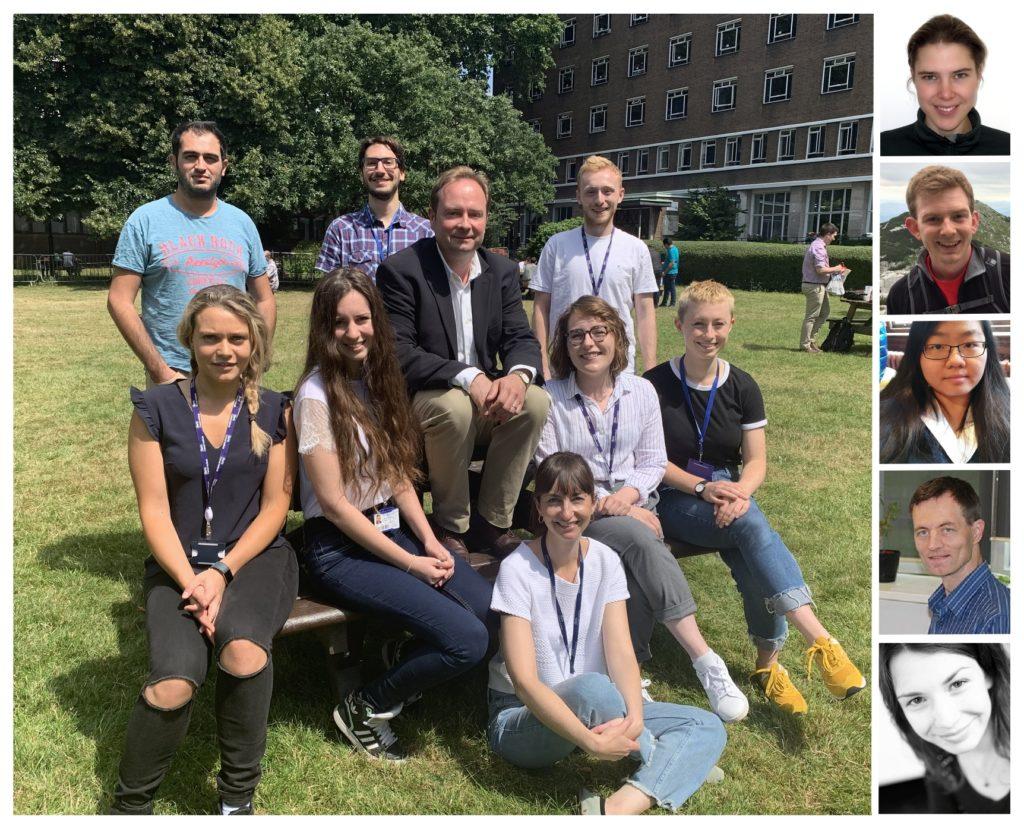Research Focus
*Please note that Professor Kranc and his team have moved to the Institute of Cancer research, but remain honorary members of the BCI.*
The central aim of our laboratory is to understand the biology of leukaemic stem cells and identify therapeutic targets to specifically eradicate them, thus discovering novel and efficient leukaemia therapies. We also focus on understanding haematopoietic stem cell biology with the hope to harness this knowledge for expanding them for therapeutic purposes.
Key Publications
The mRNA m6A reader YTHDF2 suppresses proinflammatory pathways and sustains hematopoietic stem cell function. J Exp Med (2021) 218(3):e20200829. PMID: 33156926
Targeting the RNA m6A Reader YTHDF2 Selectively Compromises Cancer Stem Cells in Acute Myeloid Leukemia. Cell Stem Cell (2019) S1934-5909(19)30120-1. PMID: 31031138
Fumarate hydratase (Fh1) is a critical metabolic regulator of haematopoietic stem cell functions. J Exp Med (2017) 214(3), 719-735. PMID: 28202494
Hif-1α and Hif-2α synergise to suppress AML development but are dispensable for disease maintenance. J Exp Med (2015) 212, 2223-2234. PMID: 26642852
Cited2 is an essential regulator of adult hematopoietic stem cells. Cell Stem Cell (2009) 5, 659-665. PMID: 19951693
Major Funding
- 2018-2023- Cancer Research UK (Programme Grant), Targeting RNA metabolism to expand haematopoietic stem cells and eradicate acute myeloid leukaemia, £1,822,455
- 2018-2021- Blood Cancer UK (Project Grant), RNA splicing regulator Jmjd6 as a new tumour suppressor in acute myeloid leukaemia, £250,000
- 2017-2020- Medical Research Council (Project Grant), Therapeutic targeting of HIF prolyl hydroxylases in acute myeloid leukaemia, £480,000
- 2013-2019- Cancer Research UK (Senior Fellowship), Hypoxia signalling pathways in normal and leukaemic stem cell functions, £1,679,467
Themes/Keywords
Research
Acute myeloid leukaemia (AML) is an aggressive disorder of haematopoietic stem cells (HSCs) and progenitors, which acquire driver mutations to generate treatment-resistant leukaemic stem cells (LSCs). LSCs fuel the over-proliferation of primitive myeloid progenitors, which damage the bone marrow and multiple organs, resulting in widespread tissue devastation. Current AML therapies are toxic to normal haematopoiesis, and often fail to eliminate LSCs. The surviving population of LSCs drives minimal residual disease, ultimately causing fatal disease relapses. Given the sobering survival outcomes, it is critical to identify new therapeutic targets for selective LSC elimination. Our laboratory employs multidisciplinary approaches to identify novel therapeutic targets to eradicate LSCs without perturbing normal HSCs and multilineage haematopoiesis. We focus on the following research areas:
Theme 1: Targeting RNA modifications to eliminate LSCs in AML
The field of chemical RNA modifications (the epitranscriptome) is a promising emerging area of intensive investigations in cancer research. Seminal discoveries by our lab and others have revealed that methylation at the N6 position of adenosines (m6A) is an important regulator of LSCs in AML (in collaborations with Prof. Donal O’Carroll in Edinburgh). Our central goal is to therapeutically target the key regulators of m6A and other diverse RNA modifications to eradicate LSCs. We aim to harness this knowledge to provide novel treatments for blood malignancies and other cancers.
Theme 2: Targeting hypoxia pathways in normal and malignant haematopoiesis
While normal and malignant haematopoiesis occur in the hypoxic (low in oxygen) bone marrow microenvironment, the impact of hypoxia and hypoxia signalling pathways on normal HSC/progenitor fate decisions and leukaemogenesis remains largely unexplored. Our laboratory (in collaboration with Profs. Sir Peter Ratcliffe and Christopher Schofield in Oxford) has discovered that several hypoxia sensing enzymes play important roles in LSC biology and AML propagation. We aim to inhibit these enzymes to eliminate LSCs in AML.
Considering that LSCs serve as a paradigm for other cancer stem cells, our investigations will have broad ramifications in other blood malignancies and solid tumours.
Major Funding
- 2018-2023- Cancer Research UK (Programme Grant), Targeting RNA metabolism to expand haematopoietic stem cells and eradicate acute myeloid leukaemia, £1,822,455
- 2018-2021- Blood Cancer UK (Project Grant), RNA splicing regulator Jmjd6 as a new tumour suppressor in acute myeloid leukaemia, £250,000
- 2017-2020- Medical Research Council (Project Grant), Therapeutic targeting of HIF prolyl hydroxylases in acute myeloid leukaemia, £480,000
- 2013-2019- Cancer Research UK (Senior Fellowship), Hypoxia signalling pathways in normal and leukaemic stem cell functions, £1,679,467
Recent Publications
For additional publications, please click hereTeam

Postdoctoral Researchers
Dr Hannah Lawson, Dr Joana Monteiro De Campos, Dr Christopher Mapperley
PhD Students
Jozef Durko, Andrea Tavosanis, Elise Chloé Cécile Georges, Lydia Wang, Edward Blacker
Laboratory Technician/Manager
Lewis Allen
Biography
Kamil R Kranc is a Chair of Haematology (Full Professor) and the Deputy Lead of Centre for Haemato-Oncology at Barts Cancer Institute. Prof. Kranc completed his medical degree at the Medical University of Silesia, Poland (1994-2000), a DPhil (PhD) in Biochemistry at the University of Oxford (2000-2003) and a postdoctoral training at the MRC Human Immunology Unit in Oxford (2003-2007). He was a Junior Principal Investigator at the MRC Molecular Haematology Unit at Oxford (2007-2010), and a Group Leader at the Paul O’Gorman Leukaemia Research Centre at the University of Glasgow (2010-2013). From 2013 to 2018, he was a Professor of Molecular Haematology at the University of Edinburgh. He joined Barts Cancer Institute as a Chair of Haematology in 2018.

